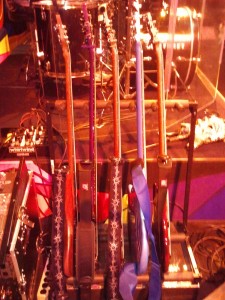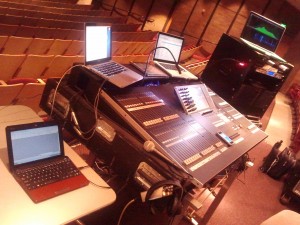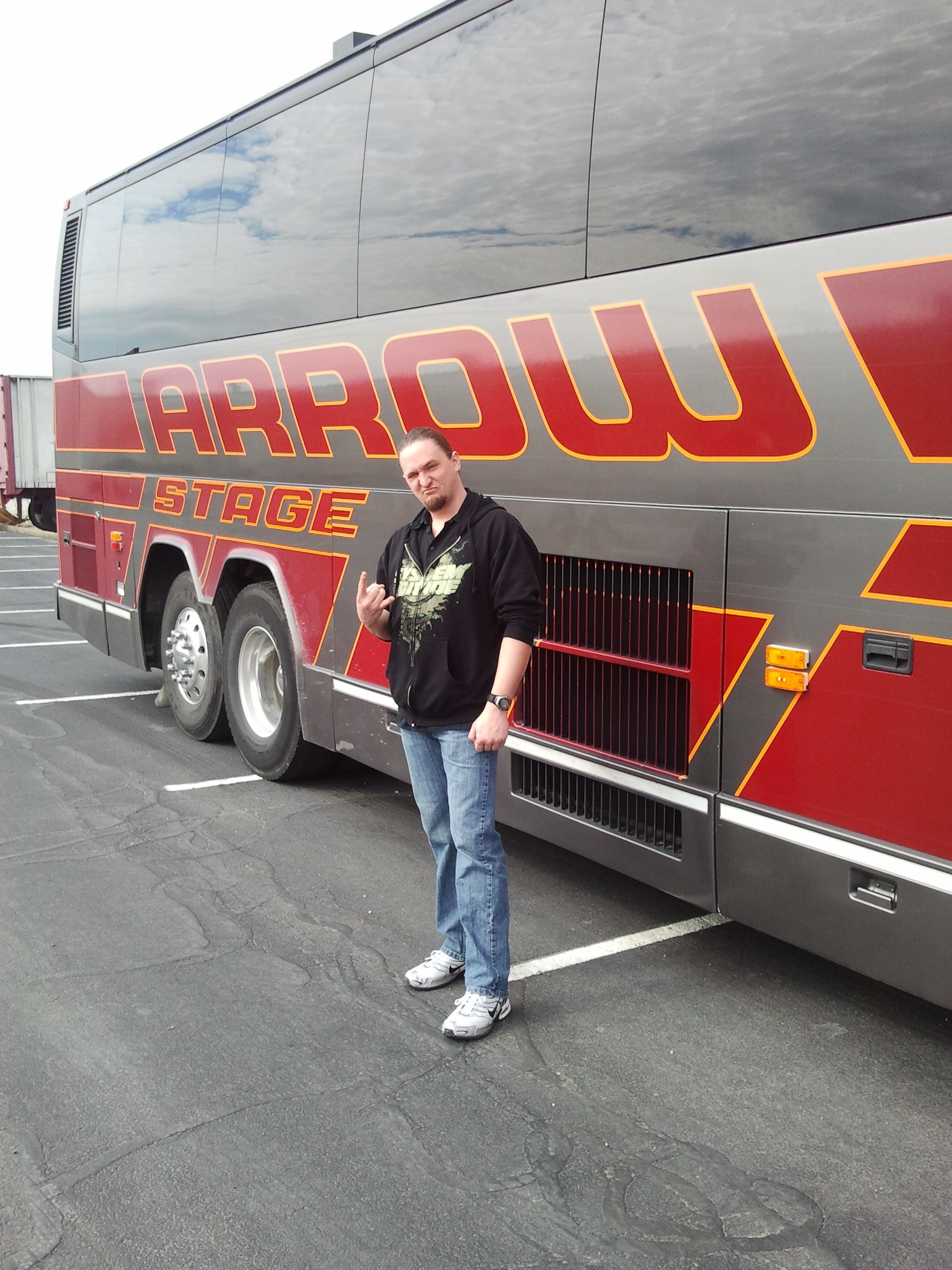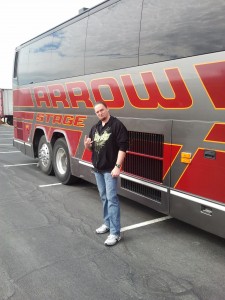The Importance of acting professional on the road:
Let’s imagine what would happen if you worked at, say, a grocery store. You show up late on a consistent basis, you show up hung over, you make other, you make unwanted flirtations with other employees and make them uncomfortable, you’re not around when people are looking for you, and you don’t adequately perform the job you were hired to do. Why would this company keep you when they have a constant influx of new applications for the job you’re unwilling or unable to perform adequately?
It doesn’t matter if you’re a musician or if you’re scraping up dead animals off the highway. Why would any company keep you if you can’t do what they hired you to do?
So whether you have a band that’s being booked through a booking agency, you work for a record label, or you’re a hired musician on a Broadway musical, you should treat this like any other paying job. Yes, you’re a creative entity, but you’re also now an employee. And like any employee there are always other applicants around every corner that are just as, if not more than, competent as you.
No matter how great you think you are, you are replaceable.
Look, if you can find a place that will hire you and put up with nonsense then best wishes to you. A company that keeps staff on like that probably won’t last. It would behoove any company to hire the best they can afford. It’s as simple as that. If they’re going to hire the best that they can afford they’re going to want to keep the best that they can afford. If your cons outweigh your pros then you’re setting yourself up for a rough road ahead.
Let’s say you get a gig as a traveling musician with a company putting on a Broadway style show. First of all, congratulations are in order, but don’t get comfortable just yet.

You’ve passed the auditions and now you have a role as a touring musician. Okay, now it’s time for rehearsals. Here’s an idea: show up on time. And when I say, “show up on time,” I mean show up early. If they say be there at 7am you should be there at least 10 minutes early. No one wants to wait around for you. I’ve got news for you, you’re not worth waiting around for. No matter how many TV shows you’ve seen about the brilliant genius no one can function without, I’m willing to bet that you’re not that genius. Even if you are it doesn’t mean you have the right to make people wait on you. Figure out how long it takes to shower, do your hair, get dressed, and get ready to move out the door.
When you show up to rehearsals you should know the material.
Even if you’re given the material a week before you show up you should’ve been listening to those songs over and over again. There should be no other playlist on your mp3 player besides the songs you should be learning. Every free moment of your day should be spent listening to and working on the material.
The first gig I ever got as a hired musician you better believe I knew the songs inside and out. I remember I got half of the set one week and spent every free second I had going over the songs. When I was about to go out one night with some friends I saw that the second half of the set was sent via internet. So I cancelled that night and went straight home to figure out the songs and practice. I did this with a full time job. There’s no excuse to not come prepared.

You need to figure out a place and a time to practice and stick to that schedule. When you actually get on the road you need to have a way to practice outside of the actual gig. This means you need to bring a travel guitar with you, a practice pad for drumming, or an isolated place for you to practice your vocals. The time of the show is not practice. The time of the show is the time people are watching you and they expect a professional performance.
When I have a show at night I always run through the set once during the day when I have free time, and one more time right before the show. When I’m not practicing the show I’m working on other material to further my skills. This might be a bit obsessive for some people but you need to keep in mind that while you rest on your laurels someone else out there is putting in more effort and is going to surpass you.
Just keep in mind that while you’re letting up on the gas there’s always someone behind you with the pedal to the floor.

Before you show up to rehearsals your gear needs to be ready.
Don’t show up and tweak tweak tweak your way through everything. No front-of-house engineer wants to put up with you night after night as you adjust your sound and reset your volume levels for each song.
For my gig most recent gig I had a different patch sound on my Line 6 for every song. Since every song represented a different musical era I had a bass tone to match that time period. So I made sure every patch had a consistent volume. Then I was done. No more tweaking. And I had no problems. I might get a

suggestion to boost something here or there but after that I wouldn’t touch it. It’s true that if you use amplifiers and cabinets you’ll have to fiddle around depending on the venue. This is a given. But you really shouldn’t have to mess with it too much. If you run direct? Then there is no need to fiddle around with your controls. Set that up before you head out to your gig. Then every night will sound the same. It’ll drive the front-of-house sound guy nuts if your volume drastically changes and messes with his settings that he’s dialed in for the night.
Your personal life on the road should remain as such, your personal life. No one wants to be burdened with your problems. Save that stuff for close personal friends. Your personal problems shouldn’t affect other people’s performance and it certainly shouldn’t spill over into their lives. When you’re on the road and you want to go out to unwind the last thing anyone wants to hear is a nightly recap of all your problems.
There’s a time and place for everything. It’s certainly beneficial to be able to talk about your problems with someone. It’s something else to make it a nightly habit.
If you had a day job where someone walked up to you on a daily basis and said,
“I’m late today cause my husband belted me in the face.”
“Well, you should probably leave him.”
Then two days later,
“Sorry I’m late again. My husband belted me in the face.”
“Why haven’t you left him yet?”
Then two more days later.
“Sorry I’m late again…”
“Let me guess, your husband belted you in the face but you haven’t left him yet.”
Eventually people are going to get fed up with you and your drama. So put a cork in it and figure it out.
It’s a no-brainer that you should act with decorum at any show. You should be respectful and cordial to the concert promoter, owners of the facility, and staff. But what if you’re a musician for hire and working for a unit on a temporary basis.
Then it’s even more important for you to know how to act while on the road, in the studio, and at rehearsals.
When you’re on the road you not only have to work with other people and see them every day (including your days off) but you also have to live with them. You really can’t get away from them. So it should go without saying not to make uncomfortable situations with these people.
Try and keep your political agendas to yourself; no one wants to hear it. This is really something I had to learn and apply to my own life. I am very opinionated on just about everything. I very rarely initiated controversial conversations but if someone asks me my opinion I’m going to give it to them. However, one has to learn when to say “fair enough” in an argument so everyone can move on.
You know the expression, “don’t shit where you eat.” Yeah, there’s a reason why they have that expression. If you create a mess with someone, guess what, you now have to live with them for the remainder of the gig. You have to sit on a bus with them; you have to ride on a plane with them.
Now, I’ll readily admit that I’m difficult to live with. I’m very picky about certain things. If someone is doing something that is the opposite of the way I would do things, I get highly annoyed, and I get annoyed very fast. But avoiding squabbles with me is very simple.

I make it very clear when I want my personal space. It’s all the time. I want my personal space all the time. That means if I have headphones on, don’t talk to me. I’m not sure why people act like they’ve never seen earphones before but the way they work is you put these little ear buds in your ears and then you can play music through them and not hear the outside world. So if you’re standing in front of me yapping away while I have earphones in, guess what, I can’t hear you and you’re wasting your breath. Pretty simple, right? Well, not everyone gets it.
It’s just common sense things that people sometimes think don’t apply to them.
Basically, ask yourself, “would I want this done to me?” If the answer is no then don’t do it.
But you’re probably thinking, “how does this affect me being a working musician?”
Well, things get around. Gossip spreads and eventually it’ll get back to your boss, aka, your music director. And if word gets back that you’re causing problems, being disruptive, making people uncomfortable, etc. then why would they ask you back when they can get someone else that won’t cause those kinds of problems?
You have to be a Company Man and/or Woman.
Yes, you’re there to put on a show. Yes, the show is fun. But don’t forget you have a boss. And regardless if the boss knows best it’s ultimately up to the boss on what stays and what goes.
So don’t impose yourself on your boss. The director of the production knows what’s best and they know what they want to do to make the show work. Don’t approach the boss to tell them all the great qualities you have because you want recognition. If you have talent and if you have something to bring to the table then they’ll ask you.
That’s not to say if you have something extra to bring.
Look, there’s a big difference in approaching someone and saying “I’m a great actor and you should put me in this documentary you’re making about the show” and “I have a couple of new pieces of gear that creates multiple vocal harmonies if you’d like to try and utilize that into the show.”
One of those statements is you wanting to be get fame and recognition so you can look cool: It’s self serving and obnoxious. The other statement is saying that you may have a way to make the show better that the person in charge might not be aware of.
Don’t be a noodge.
Don’t be that person that craves the spotlight and pouts when they don’t get it.
No one likes a noodge.
Just be gracious of the opportunity you’ve landed and make it known when the time is right.
There was one night I was on tour and there was a big cast meeting because things weren’t going well. A couple of people started making a stink in the meeting and ended up walking out. It was over the most mundane of requests. And people were walking out over it.
So after this blow up, myself and the rest of the band took it upon ourselves to thank the management for everything they’ve done so far. Because apparently, to some people, they had forgotten the opportunity they had worked for. To some people they had forgotten that the company that hired them and had been putting them up in nice hotels night after night. They had forgotten that the company that saw talent in them and decided to hire them over someone else, had supplied them with food on occasion, paid for their travel, and had given them a stage to spotlight the talents they’d spent years practicing to perfect.
So, choose your time well? Yes, I took that time to thank them for booking us in nice hotel rooms, feeding us when they could, paying us a good wage, and overall doing the right thing by us. And they appreciated what I had to say.
And to go one step further, once the tour was done I sent a “thank you” card. It was probably unnecessary but how many people do you think actually send thank you cards. The thing was that I was actually thankful the opportunity and wanted to remain in good standing with them. It was a good way to actually be gracious as well as being a good way for them to remember me.
So, while on the road you should act with decorum in all areas. Don’t be a drunken bore that people try to avoid. Don’t cause drama by pressing hot button issues and getting into conflict over your personal viewpoints. Remember, you have to live with these people and don’t forget that you’re still an employee and should act like an employee of any regular job you’d have. And don’t forget to tip the hotel maid staff if you stay in a hotel for several days. Tip the bus driver if he brings goes out of his way to bring you to a place. He saved you in money you’d spend on a cab so drop him a few bucks when you can. And as a quick side note since I brought up bus travel, read the rules of touring on a bus if your tour manager gives it to you. If it says not to bring food on the bus then don’t bring food on the bus. No one wants to smell your scrambled eggs and toast or breakfast burrito.





